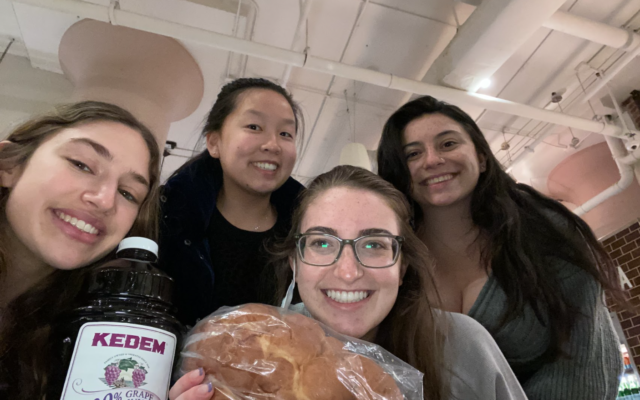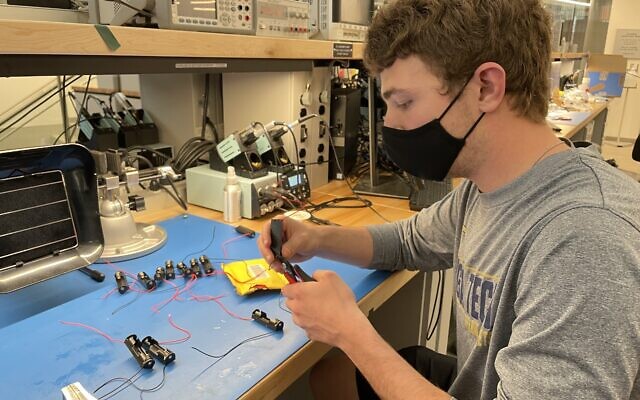Students Lead Innovative Hillel Programs
Hillels of Georgia is supporting students with innovative ideas as they take the lead in creating new programs.

In addition to their course work and extracurricular activities, college students are finding ways to create innovative programs with the support of Hillels of Georgia.
One of its premier programs is a new collaboration with Tikkun Olam Makers (TOM), a global initiative and NGO (non-governmental organization) based in Israel. According to Elliot B. Karp, CEO of Hillels of Georgia, the collaboration with TOM Global will now expand to both the University of Georgia and Morehouse College. “This demonstrates the impact Jewish values are making in our community and the demand for student-led innovation,” he said.
Founded in 2019, the TOM program at Georgia Tech won the Jewish Federation’s Propel Pitch Competition in January 2021 and was awarded a $35,000 grant. Karp believes that Hillel’s mission is closely aligned with TOM’s, offering college students opportunities to create innovative responses for those in need. “TOM is a global movement of communities that creates and disseminates affordable solutions to challenges that people living with disabilities, the elderly and the poor face in their daily lives,” Karp said.
“The great thing about TOM is that we are helping to make the world a better place,” said Jed Chizner and Justin Janawitz, UGA Hillel students who became the first TOM fellows at the University of Georgia. At Georgia Tech, where TOM was first launched, students created a Host at Home Shabbat program that eventually gained Hillel support.

Teddy Lambert, Georgia Tech student and TOM’s student manager noted the devotion students have to the program and the annual make-a-thon held on campus. Fellow Georgia Tech students, many who are engineering majors, want to take the lessons learned in class and apply them to “real life projects that make a positive impact,” he said. Fellows also seek community partners to work alongside the TOM ‘make-a-thon’ teams.
In the past, Georgia Tech collaborated with JFCS, Camp Twin Lakes and the Jewish Abilities Alliance of Georgia to identify those who might need eventual TOM projects. After observing the success of the program at Georgia Tech, UGA’s Hillel Director, Jeremy Lichtig, helped establish TOM at the University of Georgia with the generous support of The Breman Foundation, which provided a $10,000 grant. Lichtig recruited Chizner and Janawitz to lead the program as UGA TOM Fellows.
The success of this partnership led to a $5,000 grant from the Jewish Federation’s NextGen Giving Circle. The money will be used to launch a TOM cohort at Morehouse College, “one of the country’s most important historically Black colleges and universities,” said Karp. “The opportunity to share and teach the students about Tikkun Olam, while giving them an appreciation for Jewish values and Israel is tremendous. It all comes down to making the world a better place by improving and changing the lives of others.”

Shaina Lubliner, director of Jewish Student Life at Georgia Tech’s Hillel, encouraged students to offer Shabbatot all on the same night of Oct. 15, 2021. Nearly 60 students participated in Host at Home Shabbat, both as hosts and guests. Some students cooked their own dinner, including shakshuka and matzo ball soup, while others ordered in from their favorite establishments. The casual environment of these small events attracts many non-Jewish students to support their Jewish friends, making the event an excellent educational tool and cultural exchange opportunity.
Due to the rise in COVID cases, Georgia Tech student and host Sloan Salinas said, “our Hillel wasn’t going to do in-person Shabbat for at least the duration of January, so they offered students the resources to host our own Shabbat dinners.” Lubliner reported that there were nine Host at Home Shabbat dinners in January. Students take responsibility for planning and promoting their Shabbat dinner, while Hillel either provides materials and food or reimburses students for their expenses.

Salinas says hosts like her enjoy planning their own menus. “Cooking together is also a fun way to hang out with each other,” she said. She feels this kind of program is really beneficial to Jewish students, allowing them to connect with Jewish tradition in a deeper sense. She said it’s also helpful for “non-Jewish students who can join in the dinners, allowing them to learn more about their Jewish friends and their customs in a very low-stakes environment. There’s no need to dress up if you don’t want to.”
Jewish students at Georgia Tech who want to welcome friends and neighbors into their homes “are empowered to take an active role in their Jewish identity and host a Shabbat dinner while they are in school, as it means they are likely to continue to do so even after they graduate from Georgia Tech,” Lubliner said.
- Education
- camp
- Local
- Flora Rosefsky
- Hillels of Georgia
- jewish federation of greater atlanta
- Tikkun Olam Makers
- Elliot B. Karp
- TOM Global
- University of Georgia
- Morehouse College
- Georgia Tech
- Propel Pitch Competition
- Jed Chizner
- Justin Janawitz
- Host at Home Shabbat
- Teddy Lambert
- Camp Twin Lakes
- Jeremy Lichtig
- NextGen Giving Circle
- Shaina Lubliner
- Sloan Salinas



comments